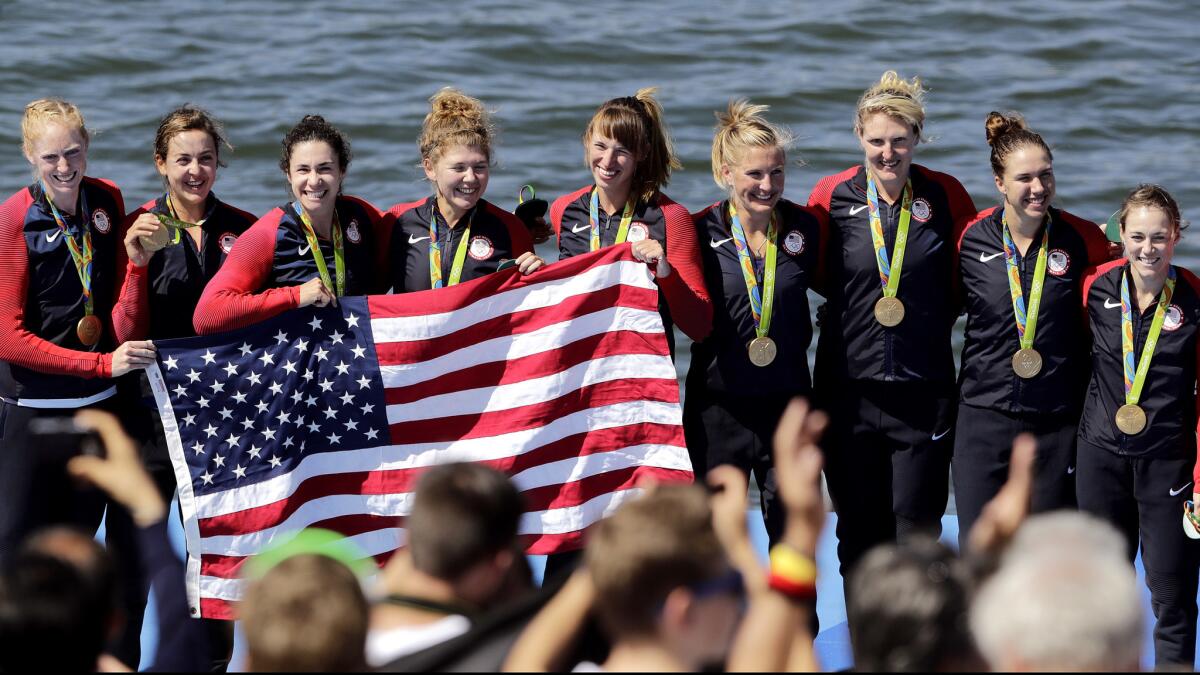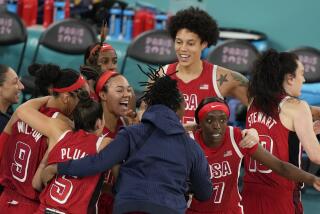U.S. women continue rowing dominance in the eights

Reporting from Rio de Janeiro â The first time Kerry Simmonds tried rowing was the summer before her freshman year in college. It was a nice day. Her mother suggested they go to San Diegoâs Mission Bay and, what the heck, take a learn-to-row class.
âIt was terrible, Simmonds said, âa terrible time.â
It wasnât so bad Saturday on Rioâs Lagoa Rodrigo de Freitas, where the U.S. womenâs eight won the gold medal and perpetuated one of the great runs of dominance in Olympic sports. That makes it 11 straight Olympic or world championship titles, or one more than the Soviet Union menâs hockey team ran off from 1963 to 1972.
The most impressive part, though, was that the nine-woman U.S. boat (eight on oars plus a coxswain) had only two holdovers from London: Eleanor Logan and Meghan Musnicki. And four of the eight rowers were college walk-ons.
Simmonds played basketball, cross country and was on the track team in high school and went to Washington with more scholarly ambitions. Then she saw a sign for rowing tryouts, figured her experience on Mission Bay couldnât be that bad, figured it might be a good way âto meet new people and stay active.â By her junior year, she had a scholarship.
Soon she had been sucked into the under-23 national program and then the senior national team that splits time between Princeton and the Olympic training center in Chula Vista. And there, she quickly discovered their secret sauce.
There are a lot of rowers there, and a lot of really good ones. And theyâre all smart. They all can do the math.
âPeople ask why the U.S. womenâs rowing team has been so successful,â Musnicki said. âItâs because of the group and the drive of all the ladies we train with daily. Thereâs no room for complacency. If you get complacent, there is another woman that will take your spot. We left 17 to 20 women in Princeton who could have made a boatâ for the Olympics.
On Saturday, a decade-long dominance did not immediately translate into the lead in the 2,000-meter race. The Americans were third after 500 behind Canada and the Netherlands, and still third at 1,000.
Then coxswain Katelyn Snyder screamed: âThis is the U.S. womenâs eight.â
At 1,500 meters, they led by two seconds.
They won in 6 minutes 1.49 seconds â their 2.49-second margin bigger than in 2008 or 2012. Britain was second, and Romania third.
Instead of picking a boat years in advance and refining its synchronicity, the U.S. program has dozens of women battle for a spot in the eight and doesnât name the final configuration until the spring.
âItâs an amazing feeling to have different levels of experience and then to get on the same page, nine of us,â said Logan, who won her third gold. âItâs so powerful. Itâs really not easy to do. Iâm so proud we were able to do that.â
Britainâs medal was its first in history in the womenâs eight.
âIâve been here getting beat by the Americans for the last 11 years,â said Jessica Eddie, 31, who has been racing internationally since 2005. âSuccess breeds success. I hope this will trickle down and that women who will now be coming into the sport for the next four, eight, 12 years can believe they can do it.â
More to Read
Go beyond the scoreboard
Get the latest on L.A.'s teams in the daily Sports Report newsletter.
You may occasionally receive promotional content from the Los Angeles Times.






